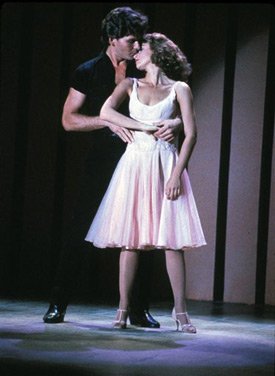Patrick Swayze: This Jewish Girl Will Miss You

You Are More Than a Ghost to Us
For Jewish women of a certain age, Patrick Swayze will always occupy a special corner of the heart. Tough and tender, he embodied for some of us — ok for me, at least — a certain fantasy. Let’s call it the Jewish girl’s yearning for the blue-eyed Christian boy — akin to the Jewish boy’s yearning for the golden-haired Christian girl. If I used the term shiksa it would not be in the derogatory sense but as a shorthand description of a seemingly blithe spirit, unencumbered by the fears and gnawing guilt that are the legacy of 5000 years of tortured history and our ambivalent attitude to following strict traditions.
I first took note of Swayze in his tight black T-shirt long before he was a superstar, when he played Darrel, the older brother of the sensitive protagonist Ponyboy in Francis Ford Coppola’s “The Outsiders.” Many years later, I loved the way he held Demi Moore from behind in the ceramics scene in “Ghost,” and the end of the film, when he appears as a hologram to say: “It’s amazing, Molly. The love inside. You take it with you.” It may have been shmaltz, but it was great shmaltz, and what could be better than that? Of course it is especially poignant, yet inspiring, to remember that scene now.
Back to Swayze’s appeal to Jewish girls, at least to this one. What novelist Philip Roth captured in books like “Portnoy’s Complaint” and “The Professor of Desire” — the dark, neurotic, intellectual Jewish protagonist’s lust for the “appetizing shiksa” — the film “Dirty Dancing” captured with Swayze as street smart Johnny Castle opposite Jennifer Grey’s adored, idealistic, overprotected Jewish teenage girl, Baby.
Of course, like Roth’s characters — “the Monkey,” a promiscuous beauty in Portnoy, and the sexually uninhibited Swedish girls David Kepesh romances in“The Professor of Desire” — Swayze’s character Johnny in “Dirty Dancing” was an individual with plenty of his own problems. His self-doubts are hinted at in the scene after Johnny and Baby make love and he talks about how he’s never met a woman like Baby before and he doubts she will stay with him (and by the way, we know she’s a Woman now thanks to him!) But it seems his problems are the stuff of life, as opposed to stuff that’s in his head.
Even though the idea that he is the natural man, guilt-free and shtick-free, simple, bold and athletic, purely sexual, is perhaps an illusion, and he’s as complex as Baby, somehow his shtick is different from her shtick. Which is what makes them such a red-hot couple.
Who can forget the lake scene where Johnny lifts the dripping and laughing Jennifer Grey by her hips high above his head, over the sparking lake, as they rehearse that daring dance move again and again?
How about the scene — which almost rises to the level of Greek drama — when Johnny confronts Baby’s wonderful, doting father on the dance floor at the Catskill’s Resort where the movie takes place and says the immortal line: “Nobody puts Baby in a corner”? He’s blazing a trail through layers of well-intentioned overprotection and family mishegas to enable her to shine, to grow, to become a woman.
And who can forget how simply beautiful he was in that tight black T-shirt?
This Jewish girl will miss you, Patrick Swayze, and is thankfully remembering your great gifts. I know that somewhere you are leaping and dancing, and I hope it is true you will take our love with you.
This entry was written by Heather Robinson and posted on September 18, 2009 at 12:21 pm and filed under Commentary. permalink. Follow any comments here with the RSS feed for this post. Keywords: film, womens-interest. Post a comment or leave a trackback: Trackback URL. */?>




